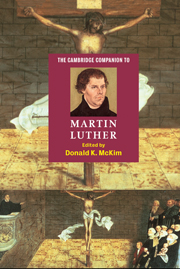Book contents
- Frontmatter
- Part I Luther’s life and context
- Part II Luther’s work
- 3 Luther’s writings
- 4 Luther as Bible translator
- 5 Luther as an interpreter of Holy Scripture
- 6 Luther’s theology
- 7 Luther’s moral theology
- 8 Luther as preacher of the Word of God
- 9 Luther’s spiritual journey
- 10 Luther’s struggle with social-ethical issues
- 11 Luther’s political encounters
- 12 Luther’s polemical controversies
- Part III After Luther
- Part IV Luther today
- Select bibliography
- Index
12 - Luther’s polemical controversies
from Part II - Luther’s work
Published online by Cambridge University Press: 28 May 2006
- Frontmatter
- Part I Luther’s life and context
- Part II Luther’s work
- 3 Luther’s writings
- 4 Luther as Bible translator
- 5 Luther as an interpreter of Holy Scripture
- 6 Luther’s theology
- 7 Luther’s moral theology
- 8 Luther as preacher of the Word of God
- 9 Luther’s spiritual journey
- 10 Luther’s struggle with social-ethical issues
- 11 Luther’s political encounters
- 12 Luther’s polemical controversies
- Part III After Luther
- Part IV Luther today
- Select bibliography
- Index
Summary
Martin Luther was a theologian of remarkable rhetorical gifts who developed and displayed his theology in the give-and-take of ferocious, published debate; he was one of Christianity's great polemicists. In this chapter, we explore the role of printing, the world view that grounded Luther's polemical approach, the developments in the larger Reformation movement that shaped the approach and style of polemical contests, and the interpretive challenges posed by the polemics of the older Luther.
During Luther’s lifetime the Reformation went through two phases that shaped the character of Luther’s controversial writings and their audience. In the first phase Luther defined a movement. He addressed most of his polemics to an empire-wide audience of readers and auditors. He pointed out the failings within the papally controlled Catholic Church and advocated reforms based on his understanding of the gospel. He attacked, but he also sought to persuade, to educate, and to inform. His main authority was Scripture.
In the second phase Luther was engaged in building and defending an institution. He addressed most of his polemics to readers and auditors who were already Evangelicals or more narrowly Lutherans. He continued to explain and educate but spent proportionately more effort exhorting his co-religionists. He continued to appeal to Scripture but supplemented these appeals with claims to personal authority based on his unique role within an Augustinian view of history.
- Type
- Chapter
- Information
- The Cambridge Companion to Martin Luther , pp. 192 - 206Publisher: Cambridge University PressPrint publication year: 2003
- 2
- Cited by



